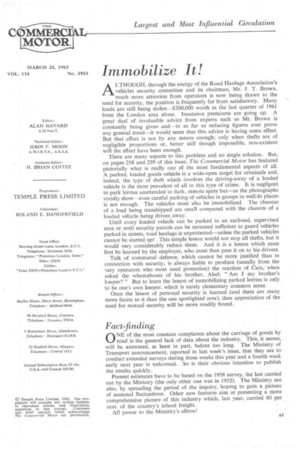Immobilize It!
Page 35

If you've noticed an error in this article please click here to report it so we can fix it.
ALTHOUGH, through the energy of the Road Haulage Association's vehicles security committee and its chairman, Mr. J. T. Brown, much more attention from operators is now being drawn to the need for security, the position is frequently far from satisfactory. Many loads are still being stolen—£200,000 worth in the last quarter of 1961 from the London area alone. insurance premiums are going up. A great deal of invaluable advice from experts such as Mr. Brown is constantly being given and—in so far as reducing figures ever prove any general trend—it would seem that this advice is having some effect. But that effect is not by any means enough; only when thefts are of negligible proportions or, better still' though impossible, non-existent will the effect have been enough.
There are many aspects to this problem and no single solution. But, on pages 258 and 259 of this issue, The Commercial Motor has featured pictorially what is really one of the most fundamental aspects of all. A parked, loaded goods vehicle is a wide-open target for criminals and, indeed, the type of theft which involves the driving-away of a loaded vehicle is the most prevalent of all in this type of crime. It is negligent to park lorries unattended in dark, remote spots but—as the photographs vividly show—even careful parking of vehicles in groups in well-lit places is not enough. The vehicles must also be immobilized. The chances of a load being transhipped are small compared with the chances of a loaded vehicle being driven away.
Until every loaded vehicle can be parked in an enclosed, supervised area or until security patrols can be mounted sufficient to guard vehicles parked in streets, road haulage is unprotected—unless the parked vehicles cannot be started up! This simple lesson would not stop all thefts, but it would very considerably reduce them. And it is a lesson which must first be learned by the employer, who must then pass it on to his drivers.
Talk of communal defence, which cannot be more justified than in connection with security, is always liable to produce (usually from the very operators who most need protection) the reaction of Cain, when asked the whereabouts of his brother, Abel: "Am I my brother's keeper? " But to learn the lesson of immobilizing parked lorries is only to be one's own keeper, which is surely elementary common sense.
Once the lesson of personal security is learned (and there are many more facets to it than the one spotlighted now), then appreciation of the need for mutual security will be more readily found.
Fact-finding
ONE of the most constant complaints about the carriage of goods by road is the general lack of data about the industry. This, it seems, will be answered, at least in part, before too long. The Ministry of Transport announcement, reported in last week's issue, that they are to conduct extended surveys during three weeks this year and a fourth week early next year is welcomed. So is their obvious intention to publish the results quickly.
Present estimates have to be based on the 1958 survey, the last carried out by the Ministry (the only other one was in 1952). The Ministry are also, by spreading the period of the inquiry, hoping to gain a picture of seasonal fluctuations. Other new features aim at presenting a more comprehensive picture of this industry which, last year, carried 60 per cent. of the country's inland freight.
All power to the Ministry's elbow!




















































































































